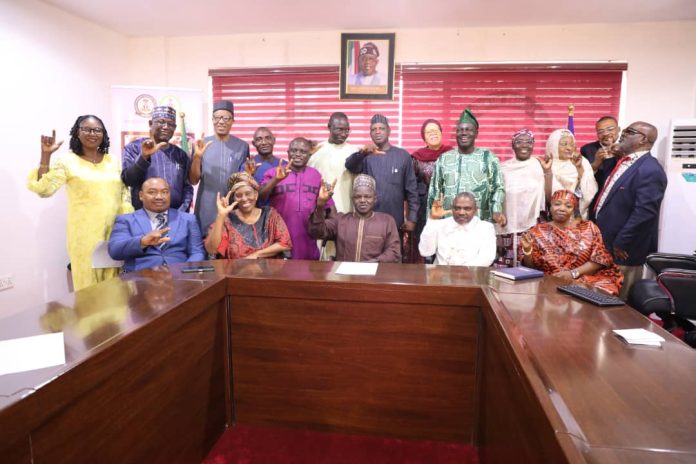Abuja, August 21, 2024 — The National Commission for Persons with Disabilities (NCPWD) has once again underscored its unwavering commitment to fostering inclusive policies that cater to all clusters of disabilities across Nigeria. This renewed assurance comes as part of the Commission’s alignment with the “Renewed Hope” agenda of the current administration, led by President Bola Ahmed Tinubu.
The assurance was delivered by Chief Ayuba Gufwan, the newly appointed Executive Secretary of NCPWD, during a recent parley in Abuja with a delegation from the Pioneers of the Nigerian National and International Disability Civil Rights Movement and Policy Chapters—a prominent disability advocacy group.
A Renewed Commitment to Disability Inclusion
Addressing the delegation, Chief Gufwan expressed profound gratitude for the group’s support and confidence in his leadership. He emphasized the Commission’s commitment to working collaboratively with all disability clusters to advance the welfare of Persons with Disabilities (PWDs) in Nigeria.
“We are fully committed to working with all clusters of Persons with Disabilities to ensure that the benefits of our collective efforts are realized,” Chief Gufwan stated. “Our goal is to deeply entrench the agenda of President Bola Ahmed Tinubu’s administration, which prioritizes the inclusion and empowerment of every Nigerian, especially those within the disability community.”
Chief Gufwan also reaffirmed the Commission’s dedication to an open-door policy, emphasizing that this approach is vital to achieving the overarching objective of “leaving no one behind.” This ethos is in line with global best practices and is aimed at ensuring that every PWD in Nigeria has a voice and access to opportunities.
“We are open to partnering with both national and international bodies to ensure that the rights and privileges of persons with disabilities are protected, as outlined in the Discrimination Against Persons with Disabilities (Prohibition) Act, 2018,” he said. “Our mission is clear: to create a society where PWDs are no longer marginalized but are active contributors to national development.”
Support from Disability Rights Advocates
The parley was also an opportunity for the Pioneers of the Nigerian National and International Disability Civil Rights Movement and Policy Chapters to express their support for the new leadership at NCPWD. Mr. Job Napoleon, the spokesman for the group, pledged the organization’s readiness to partner with the Commission in achieving its goals and fulfilling its official mandate.
“We are here to offer our unwavering support to Chief Gufwan and the entire leadership of the Commission,” Mr. Napoleon said. “His appointment by Mr. President is not just an acknowledgment of his capabilities but also a call to service. We are confident that under his leadership, the disability community in Nigeria will experience unprecedented growth and inclusion.”
Mr. Napoleon’s words were echoed by Mrs. Omotunde, a well-respected figure in the disability rights movement, who also attended the meeting. She, along with other stakeholders present, expressed their trust and optimism in the new Executive Secretary’s ability to steer the Commission toward greater achievements.
“Chief Gufwan’s leadership comes at a crucial time for the disability community in Nigeria,” Mrs. Omotunde noted. “We believe that his experience, coupled with his commitment to inclusive governance, will be instrumental in advancing the rights and well-being of PWDs across the country.”
A Vision for the Future
Chief Gufwan’s tenure at the NCPWD is expected to focus heavily on the full implementation of the 2018 Disability Act, which remains a critical tool in the fight against discrimination and the promotion of equal rights for PWDs. Under his leadership, the Commission is poised to intensify efforts in advocating for accessibility, inclusive education, economic empowerment, and the overall integration of PWDs into the fabric of Nigerian society.
The Commission’s strategy will involve close collaboration with various stakeholders, including government agencies, non-governmental organizations, international partners, and the private sector, all working towards a common goal of making Nigeria a more inclusive nation.
Chief Gufwan’s emphasis on an open-door policy is particularly significant, as it signals a shift towards greater transparency and stakeholder engagement within the Commission. By actively seeking input and collaboration from all sectors of society, the NCPWD aims to create policies that are not only inclusive but also reflective of the diverse needs and aspirations of Nigeria’s disability community.
Looking Ahead
As the NCPWD moves forward under Chief Gufwan’s leadership, there is a palpable sense of optimism within the disability community. The recent parley with the Pioneers of the Nigerian National and International Disability Civil Rights Movement and Policy Chapters is just one of many steps the Commission is taking to ensure that the voices of PWDs are heard and their rights upheld.
The Commission’s commitment to inclusivity and collaboration, as outlined by Chief Gufwan, is a promising indication that the disability community in Nigeria is on the brink of significant progress. As these efforts unfold, the NCPWD is expected to play a pivotal role in shaping a future where PWDs are empowered to contribute meaningfully to national development, in line with the Renewed Hope agenda.
For the millions of PWDs across Nigeria, the NCPWD’s renewed focus on inclusive policies represents a beacon of hope—a commitment to a future where every Nigerian, regardless of ability, can thrive and achieve their full potential.
Conclusion
The NCPWD’s engagement with disability rights advocates and its pledge to uphold inclusive policies under the Renewed Hope agenda marks a crucial moment in the ongoing struggle for disability rights in Nigeria. With Chief Ayuba Gufwan at the helm, there is renewed optimism that the Commission will not only meet its mandate but also set new standards for disability inclusion in Nigeria.
As the NCPWD continues to build on this foundation, the disability community, along with its allies, remains committed to supporting and working alongside the Commission to create a more inclusive and equitable society for all.


